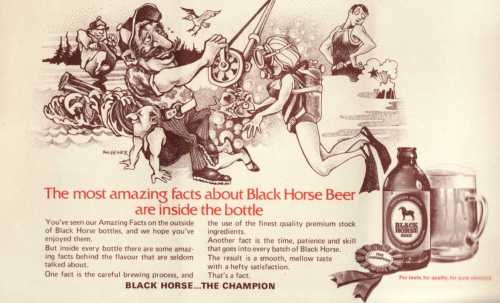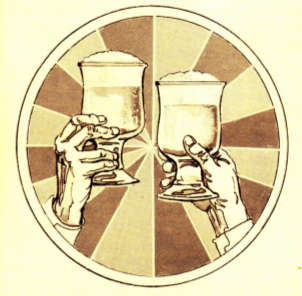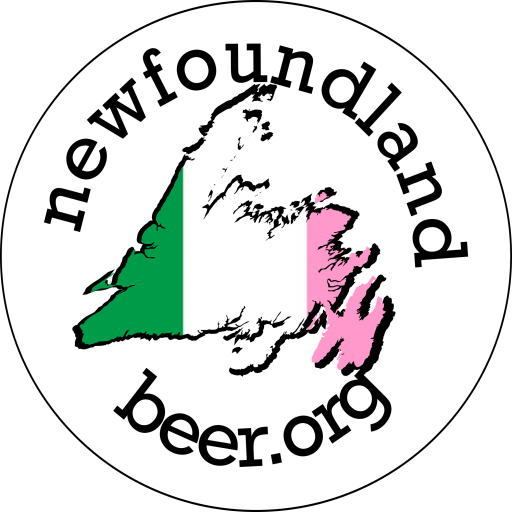During the period that followed the Second World War, beer advertising became big business. Across North America, brewers jockeyed for the beer dollars of the rapidly growing cohort of baby boomers by illustrating how their beers were part of a healthy image of domesticity or a youthful and active product. In Newfoundland, however, one of the most successful kinds of advertising was the songbook. Newfoundland Songs, published in ten editions between 1950 and 1977, showcased the songs of Newfoundland to sell cases of Dominion Ale. Found within cases of Bennett Brewing and later (after 1962) Carling O’Keefe products, the songbook played with nostalgia write the Bennett brand deeper into Newfoundland’s history.
In their 1978 article in the journal Culture and Tradition, folklorists Paul Mercer and Mac Swackhammer provide a good cultural history of the songbook. They argue, not unlike today’s nostalgia macros, songbooks were the continuation of a long process of appealing to “the present ‘modern’ generation to participate with pride in these aspects of the good-old-days” (36). Songbooks have long been a useful way for marketers to make their advertisements last longer. Publish an advertisement in a paper and you’ll likely be seen for a day, make your advertisement a part of a culture of singing and ensure your book is valuable and circulated around rural outports, and you’ll be seen for generations. Ask around a well-kept outport home where music was a part of their tradition and you’ll likely find a well worn Dominion or Bennett Songbook.
Mercer and Swackhammer outline a long history of these songbooks, where advertisements were even included as songs, however, since they have well covered the evolution of this art in Newfoundland, I’ll leave that aspect for them. We’ll pick up the story with Gerald S. Doyle. Doyle was a travelling salesman who circulated almanacs and songbooks advertising for the A. W. Chase medicine company. But Doyle was also a collector of Newfoundland songs who published his collection in free books found at his drug outlets throughout the island.

An older (pre-1962) label for Bennett Haig Ale. At the time of the songbooks, it would have been switched to the iconic blue label.
The Bennett Brewing Company aimed to emulate Doyle’s success and “began to publish its own books, modelled on and copied from Doyle’s” (39). Bennett Brewing extended upon Doyle’s advertising rhetoric by making their beer more deeply implicated within the traditional material they were transmitting. They also played upon their history within the province as “The oldest manufacturing industry in Newfoundland” by putting their own history as the frontispiece or centrepiece of the songbook. Adorned with lines like “A Newfoundland Tradition, HAIG ALE” and “A rainbow at night… A sailor’s Delight, Not only at night, Rainbow Beer is always a delight,” Mercer and Swackhammer argue that Bennett carefully aligned the good times and singing offered by the songs in the book with the product they were selling.
Interestingly, they note that when Bennett Brewing was purchased by Carling O’Keefe in 1962 there was a change in the style of the songbooks. After the purchase, they argue, the songbooks “no longer reflected a Newfoundland self-consciousness, but a mainland conception of Newfie-ism designed to sell beer.” The songbooks I have from 1974 and 1977 (an partially aimed at tourists visiting Newfoundland for the 1977 Canadian Summer Games), show some of the characters and distinctions Mercer and Swackhammer point out, but I think they are perhaps a little too strong in their “mainland conception” argument, as we will now see.
The Eighth Edition from the early 1970s sticks more to the “wrapper ads” style, with advertisements for Domion Ale, “A great Newfoundland tradition,” O’Keefe’s Extra Old Stock (an O’Keefe brand that lasted in Newfoundland until the 2000s), Old Vienna (another O’Keefe brand no longer found in Newfoundland), and Black Horse (yet another O’Keefe brand which made no allusions to being from Newfoundland). The Domion Ale ad is particularly interesting:
The copy reads:
There’s something really different about the first time you sit down to enjoy a Dominion. One look at it tells you to get ready for a satisfying, ‘all male’ taste.
Dominion’s brewed high on the hops to give you a true, distinctive, ‘for men only’ flavour. It’s the proud product of over 140 years brewing skill. A great Newfoundland tradition.
That’s why the men who know beer best consider Dominion an old friend. It you haven’t uncapped a Dominion in a while, why not make a new friend out of an old friend?
Enjoy a Dominion Ale. You’ll know you’re having one.
Besides being overtly masculine, “You’ll know you’re having one” has to be the worst tag line in any beer advertisement ever. Though perhaps it’s better than some modern beers where you almost don’t know if you’re having one. The foreword and acknowledgement outline a little more of what was outlined above. It reads:
Foreword
The colourful history and tradition of Newfoundland are perpetuated in the songs of her people. In this collection of favourites we glimpse the daily lives of the hardy, happy folk who tackled heavy seas and rocky soil with a rich sense of humour.
Today their songs are sung with pride by Newfoundlanders who delight in fond recollection of the days gone by and by others simply for fun and amusement.
The Bennett Brewing Company takes great pleasure in presenting this eighth edition of our little songbook. Like our products, it is purely for your pleasure.Acknowledgement
We gratefully thank Gerald S. Doyle Limited for the use of their publication “The Gerald S. Doyle Song Book” from which we obtained the words to the songs in this book.
In doing so, we salute the memory of that great Newfoundlander, Gerald S. Doyle, who devoted so much of his time to collecting and perpetuating the songs of his beloved island home.
The songs featured included:
The illustrations in the eighth edition are minimal. Directly in the middle of the book there is an account of the history of the Bennett Brewing Company which I plan to transcribe elsewhere. The following edition, the ninth edition from 1974, was printed on heavy stock paper and remembered with nostalgia Newfoundland’s entry into confederation 25 years earlier.
George Tilley, the provincial general manager of Bennett Brewing (then a subsidiary of Carling-O’Keefe) welcomed readers:
The song-list had indeed been updated to reflect the new songs by Dick Nolan. The contents now included:
The “Dominion Coaster Offer” discusses the set of coasters I talk about elsewhere. Surprisingly, the book itself has little to do with selling beer and there is little brand-tie-in, even in Dick Nolan’s “Liquor Book” where only screech is mentioned by name. I find that Mercer’s and Swackhammer’s accusations of these being overtly mainland interpretations of Newfoundland in this edition to be a little strong. The only proper beer advertisement in the book is the below one for Black Horse (perhaps because it was a national brand, so the book could be sold on the mainland), but there is little about the ad which references Newfoundland. Even the cartoon, one of the many done by Ted Michener for Carling-O’Keefe at this time, is more Canadian than Newfoundland-focused.
The 1977 tenth edition of Newfoundland Songs was the last and is also one of the more common examples to still find around Newfoundland today. They, like the ninth edition, can sometimes still be found at used book stores for somewhere under $15.
While in a slightly slimmer format than the previous editions, it was still found in cases of beer and featured some of the most detailed illustrations of any version of the songbook.
It’s hard to choose just a few of these pages to reproduce here, since they all have at least some kind of illustration. (If you are interested in higher quality images, I have copies of the original songbooks.) There is very little to do with beer advertising in this final version. Except for the “A bit of our past to put under your glass” coaster advertisement, there was almost nothing else to show the products of Carling O’Keefe as responsible for the songbook. The final page included a simple ad for “Dominion Ale: A Newfoundland Tradition” and the final pages included, as always, a little historical snippet of the history of the Bennett Brewery.
Of the songbooks, I think this final tenth edition is the one with the most character. It contains most of the songs found in previous editions (including the Dick Nolan ones introduced in the ninth edition), but because of its pocket size and really wonderful illustrations, it’s really something special. Some of the songs even include music notion, which was not found in many of the older editions.
Mercer’s and Swackhammer’s article was published in 1978 which is almost as far away from us today (almost 40 years) as Doyle’s first songbooks were from them. Their work, as folklorists, aimed to unmask the “simplistic view of the past” as presented in these songbooks, to uncover how “a living tradition has been made iconic, reduced to jargon, and put to work for commercial purposes” (45). 1977 was the last year the Bennett Songbook was published and it is worth reflecting now on what has been lost in the absence of even this “potentially harmful symbolization of folklore.” The songbooks, while their content and presentation may have been invented, are an important part of the folklore of beer in Newfoundland. The traditions they carry as material culture being passed around and as items representing breweries now gone (both Bennett, Carling O’Keefe, and the physical Sudbury Street brewery), has real meaning beyond their “symbol and jargon.” These songbooks, beyond their value as trinkets or artifacts of a commercial culture, are important documents in Newfoundland’s Beer History.
References: Paul Mercer and Mac Swackhammer, “’The singing of old Newfoundland Ballads and a cool glass of good beer go hand in hand’: Folklore and ‘tradition’ in Newfoundland Advertising,” Culture & Tradition 3 (1978) 36-45.
















